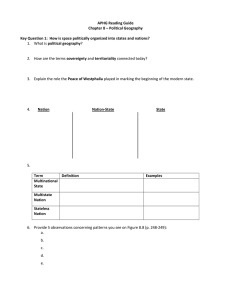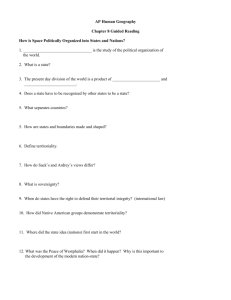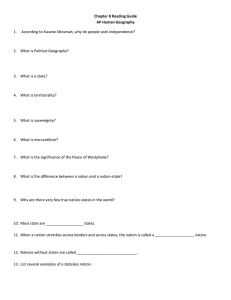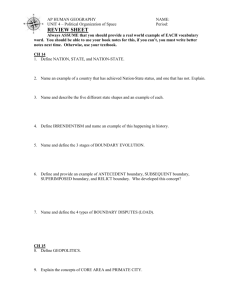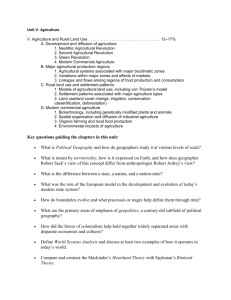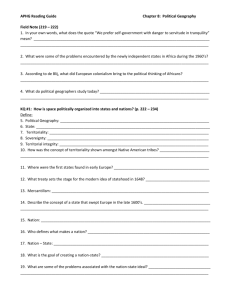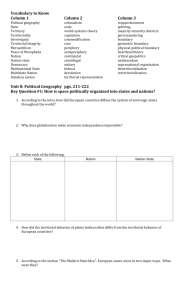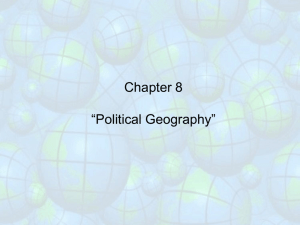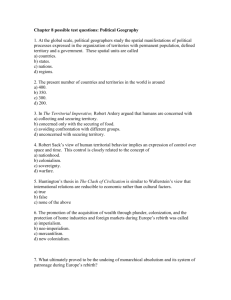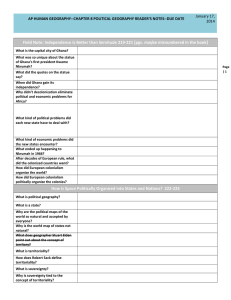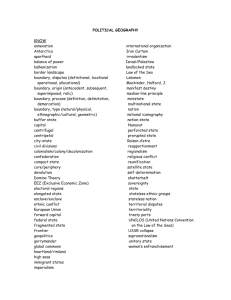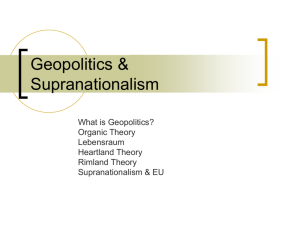File - Ms. Bohlin's Turf
advertisement
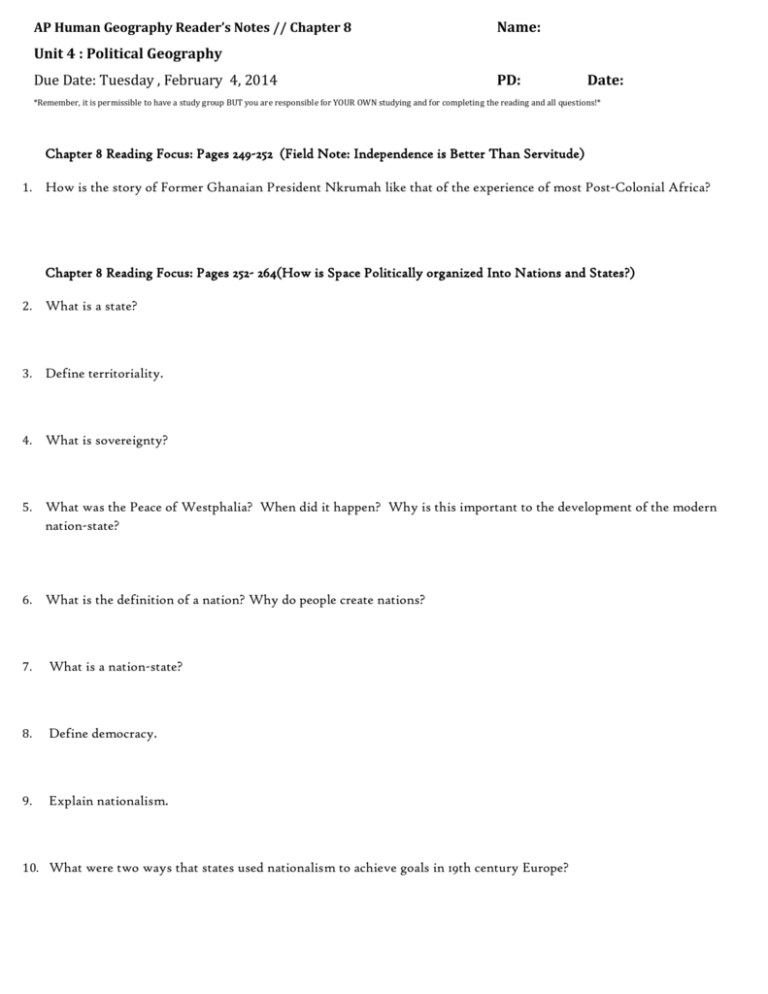
AP Human Geography Reader’s Notes // Chapter 8 Name: Unit 4 : Political Geography Due Date: Tuesday , February 4, 2014 PD: Date: *Remember, it is permissible to have a study group BUT you are responsible for YOUR OWN studying and for completing the reading and all questions!* Chapter 8 Reading Focus: Pages 249-252 (Field Note: Independence is Better Than Servitude) 1. How is the story of Former Ghanaian President Nkrumah like that of the experience of most Post-Colonial Africa? Chapter 8 Reading Focus: Pages 252- 264(How is Space Politically organized Into Nations and States?) 2. What is a state? 3. Define territoriality. 4. What is sovereignty? 5. What was the Peace of Westphalia? When did it happen? Why is this important to the development of the modern nation-state? 6. What is the definition of a nation? Why do people create nations? 7. What is a nation-state? 8. Define democracy. 9. Explain nationalism. 10. What were two ways that states used nationalism to achieve goals in 19th century Europe? 11. Explain what a multinational state is. 12. Explain what a multi-state nation is. 13. Describe a stateless nation. Give an example of a group who are a stateless nation today. 14. Define colonialism. 15. What continent was divided by European powers at the Berlin Conference? When was the Berlin Conference? 16. What is commodification? 17. Describe the basic structure of the world-systems theory 18. Describe core processes. 19. Describe periphery processes. 20. What happens in the semi-periphery? Chapter 8 Reading Focus: Pages 264-272 (How Do States Spatially Their Governments?) 21. Hartshorne described two forces within the state. One unifies people and one divides people. What are these two forces? 22. Describe a unitary government. What is the administrative framework of a unitary government supposed to do? 23. Describe a federal system of government. Describe a strong federal system and a weak federal system. 2 24. Explain devolution. Give a specific example. 25. What caused many of Europe’s devolutionary movements? 26. What regions are most likely to seek devolution? What state in the United States is most serious about devolution? 27. What part of U.S. government establishes a system of territorial representation? 28. Why do we have a census every 10 years? What happens if population shifts are noticed in the census? 29. Define and provide examples of Majority-minority districts. 30. What is gerrymandering and how is it used? Chapter 8 Reading Focus: Pages 272-275 (How Are Boundaries Established, And Why Do Boundary Disputes Occur?) 31. A boundary between states is a 32. What are the four steps involved in establishing a boundary? 33. What are geometric boundaries? How were boundary lines established at the Berlin Conference? 34. What are some problems with using physical features as boundary lines? 35. The stability of boundaries has more to do with ________________ ____________________ than with the character of the boundary itself. 36. What are 4 principal forms of boundary disputes? 3 37. Describe each of the forms of boundary disputes. Chapter 8 Reading Focus: Pages 275-278 (How Does The Study OF Geopolitics Help Us Understand The World?) 38. Define the term geopolitics. Why is it important to understand geopolitics? 39. What are the two schools of classical geopolitics? Describe them. 40. Describe the Heartland Theory. 41. Why was NATO formed? 42. What is the basic concept behind critical geopolitics? 43. How did President Ronald Reagan describe the Soviet Union and the United States? How does this reflect critical geopolitics? 44. What did President Bush say about terrorism in 2002? How does this reflect critical geopolitics? 45. Describe what is meant by geopolitical world order. 46. Who drove Iraq out of Kuwait in 1991? Why is it important that Russia sided with the United Nations? 47. What is unilateralism and who is in a position of hard power dominance? 4 Chapter 8 Reading Focus: Pages 278-286 (What Are Supranational Organizations, And What Are Their Implications For The State?) 48. Explain what a supranational organization is. 49. What did Woodrow Wilson propose after WWI? What happened as a result? 50. Why was the Permanent Court of International Justice formed? 51. What supranational organization was formed after WWII? As of today, how many states are members? 52. What are three important subsidiaries of the U.N.? 53. What organizations of the U.N. have done important work in human rights? 54. What can violations of internationally approved standards of behavior lead to? What are some examples of this? 55. Why was the European Union established in 1992? What is the name of the single currency the EU established? What do they call the region where this money is used? 56. What state in the EU is currently the most economically powerful? 57. What are the problems with Turkey joining the EU? 58. Why is economic supra-nationalism so important? 5
